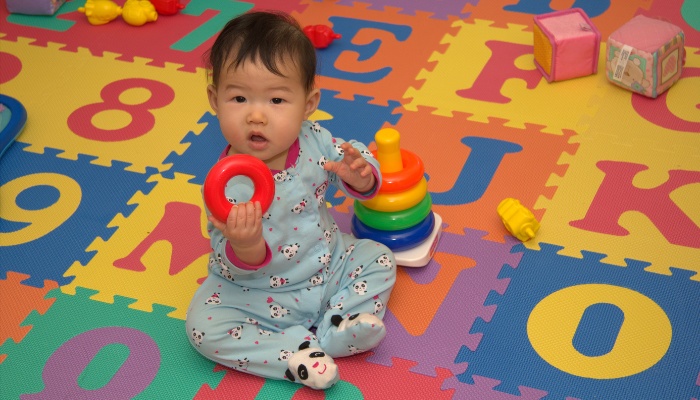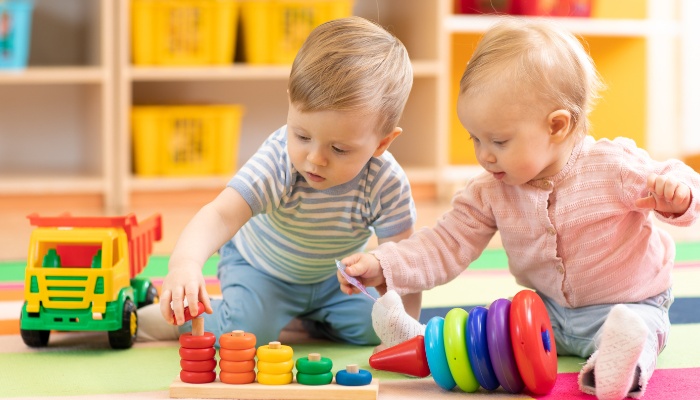Some parents have the option to choose whether or not to use daycare services, while for others, it is essential.
Deciding when your child is ready is not easy, and when the time comes for that dreaded first day, there will likely be a few unexpected challenges.
What are the best and worst ages to start daycare? There is no specific age to start daycare. The safest approach is wait until they’re ready socially, emotionally, and physically. For some, this can be as early as 3 months. The worst age to start daycare is 3-4 years as this makes it hard for a child to adjust to the new environment and routine.
Children generally take around 2 to 4 weeks to adapt to being in daycare, but some children can take up to 2 months or more. So, it really depends on the child.
If you’re worried that you might be making the wrong choice about when to send your child to daycare, let’s consider what the experts recommend and the various influencing factors.
Best Age To Start Daycare
While there’s no guidebook out there that can say definitively what age is the best for your child to start daycare, professionals and experts have advice on what ages work best for most children and how to approach the situation.
What the Experts Recommend
Although babies can start going to daycare as young as 6 weeks old (many daycares won’t accept children so young), most experts recommend only starting the process from 12 months onwards.
This is because it allows time for parents to establish a secure attachment with their child and set healthy sleep and feeding patterns before presenting the child with something new to adjust to.
Starting Daycare at 1 Year Old
When starting your 1-year-old at daycare, you can expect them to feel frustrated, anxious, and even emotionally insecure.
This is a big transition for your child, but the good news is that your child won’t be so overwhelmed with time and consistency.
Below are a few quick tips to help prepare your child and help them through the initial start of daycare:
- Keep your home routine as usual so your child deals with only a few changes simultaneously.
- Your child may be emotionally and physically overwhelmed, so adopt an earlier bedtime, include some high-protein snacks in their lunch box, and give your child some extra attention when collecting them from daycare.
- Talk to your child about daycare before the first day comes along. Prepare your child in terms of what to expect. Speak about the exciting time they’ll have, and talk about the games they will play, the friends they will make, and so on in a positive way.
What if Your Child Needs To Start Before Then?
If your child needs to start daycare before they turn one year old, you should seek a daycare with experience working with younger children.
Unfortunately, not all daycares have the experience of working with smaller/younger children and won’t have children of a similar age.
Negative Effects of Beginning Daycare Too Early
If you must put your little one in daycare before their first birthday, be prepared for a few negative results.
- Poor parent-child attachment – Children younger than one need to spend one-on-one time with parents so that they can recognize their primary caregiver and form a strong emotional and physical bond.
- Increased stress – Children spending time away from the home before they’re ready can cause cortisol levels to rise and children to deal with stress before they’re capable of knowing what it is and how to handle it.
- Antisocial behavior – Some children under stress may lash out and get angry or aggressive. This can be seen as antisocial behavior in a daycare environment.

Worst Age To Start Daycare
The worst age to start daycare is before your child is physically or emotionally ready to do so.
However, if you can, you should start your child at daycare as late as possible. In most cases, this is around 3 years old.
What the Research Indicates
According to research, the first year of life is the worst time for a child to start daycare because their developing brain requires a lot of attention and nurturing from a primary caregiver.
What Struggles To Expect
Studies have shown that the more a child under 4 spends time with non-parental caregivers, the lower their overall IQ can be.
In some instances, children starting daycare too soon can develop poor sleep patterns and negative attachment styles.
When To Start Daycare: Deciding Factors
What factors can impact your decision on when to start your child at daycare? Let’s consider the following:
Age of the Child
If you can, you should keep your child at home with you beyond the first year of life. If your child is around 2-3 years old, it’s considered more acceptable to send them to daycare.
Finances
For some parents, daycare can be costly, so being at home with your child makes more sense.
That said, some parents need to get back to work and can only take a certain amount of time off of work from the birth of their child.
How Long the Child Will Be There Each Day
If you’re on a budget, you can consider half-day daycare or even sending your child to daycare only on certain days of the week.
Perhaps you only work mornings or only need assistance on certain days. Make sure you know what your requirements are before you start shopping around for a daycare.
How Well the Child Does Without You & Normal Routine
If your child cannot cope with being away from you, it’s not considered fair to “abandon” them at daycare.
You should only send your child to daycare if they can handle the emotional impact of spending a day away from you and their normal routine.
You can monitor your child at daycare by asking the caregivers to send you updates, videos, and pictures during the day.
Does the Child Play Well With Others and Follow Directions?
If your child cannot play well with others and follow simple directions, they won’t cope at daycare. All children must be social and kind and know how to share and play well with others.
You can teach a child these skills, but this may require you to wait for your child to be old enough to learn these things.
Alternatives to Daycare
If you don’t want to send your child to daycare or want to know what your alternative options are, consider the following:
- Childcare co-operatives – These are informal care arrangements often provided by parents and caregivers. These arrangements are more cost-effective and offer you more flexibility with your care requirements.
- Hire a babysitter – If you only need care occasionally or on an ad-hoc basis, hiring a babysitter with experience working with small children might be best for your situation.
- Hire an au pair or a nanny – Au pairs and nannies can live in or out of your home and provide childcare according to the hours that you specify.
- Enlisting family members – if you have retired parents, you may want to enlist them in child care permanently or on an as-needed basis. You can pay them for their troubles, of course.
Related Questions:
Is 6 Weeks Too Young for Daycare?
Infants can start daycare as young as six weeks old, but most experts advise that parents wait a little while longer so that the child can develop a secure attachment with the parent and adjust to life outside of the womb before presenting them with an entirely new environment.
Is 6 Months Too Young for Daycare?
It’s not advised to start your child’s daycare earlier than one year of age, but you can start them earlier if you don’t have any other options.
Final Thoughts
Starting your child at daycare is sure to be a stressful time for both you and your baby.
Try to keep your baby at home with you as long as possible so that you can form a secure bond and attachment style.
If you can wait until your child is over 12 months before starting daycare, that would be best!
Jayme is a professional writer, vegan nutritionist, and relationship & communications counselor. As an avid reader, researcher, and writer, she is constantly expanding her interests and looking into new avenues of mental health awareness and self-care. She lives with her two rescue dachshunds in Hampshire in the United Kingdom.

